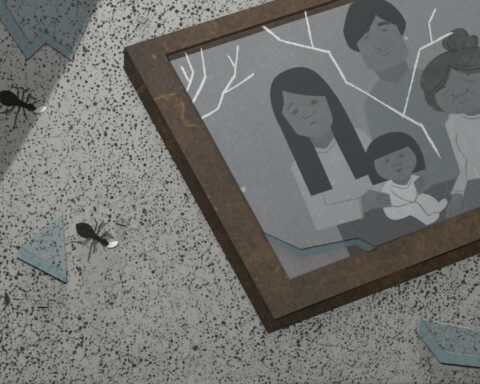This year at TIFF, short documentaries take on the personal as political, looking to how big issues impact individuals. From optimism to pessimism, calls to arms and pointed critiques, these films offer perspectives which aim to change how we think, and make a difference.
Corina Schwingruber Ilič’s All Inclusive (Programme 06) shows us a massive luxury cruise, but, amidst the fun activities, huge dinners, and generally grand amenities (pools, dance floors, light shows, and even a robot), there is a labour which maintains the vacation paradise. In glimpses of the ship’s workers, behind walls and in cramped rooms, we see a maintenance of professional stoicism contrasting with the exuberant excess of the guests around them. Questioning who gets left out of luxury, Schwingruber Ilič’s doc looks to what capitalism makes invisible in a quest for personal enjoyment, in a way that shows the lighthearted frivolity of the cruise as a poisonous fantasy.
A more uplifting story is found in Caroline Monnet’s Emptying the Tank (Programme 05) where Ashley Nichols, a Chippewa mixed martial artist, discusses how empowering athletics have been to her as a First Nations woman. Eloquently narrated by Nichols, and shot in a silky black-and-white, it is inspiring to see this woman find her passion despite hardships she has faced. Nichols’ political identity is seamlessly woven into her personal one, creating a full portrait of the fighter in just under ten minutes.
Guille Isa and Angello Faccini equally create a sensitive, intimate portrayal of their subject in Dulce (Programme 2), as they follow a young girl who is reluctant to learn her mother’s trade of harvesting shellfish. We see the banal, everyday interactions — the daughter is petulant under her mother’s orders, but both express a close bond regardless of personal interests — which gives way to a much more serious problem. The shellfish are integral to their community, but the tradition is becoming lost, particularly in the face of climate change. Dulce shows us how the quotidian exists alongside the gravity of sustainability, urging us to consider the needs of people in these circumstances.
Jayisha Patel’s Circle (Programme 04) takes a similar angle — the daily lives of three generations of women in Uttar Pradesh, India — but is much darker from the start, as they discuss the cycle of domestic violence. Something expected in their lives, and condoned by the women who have gone through it, the film culminates in a vibrant wedding, which we know is not really an event to celebrate, given the bride’s condemnation to abuse. Focusing intently on the horrific (and seemingly unchangeable) propagation of trauma, Circle raises awareness, but sadly offers no intervention, leaving us with the question of what can be done.
A highlight this year is Sam Gurry’s Winner’s Bitch (Programme 05), an animated documentary which uses interviews and archival photography to examine the life of a dog show judge. Photos come together with a frenetic energy which is nonetheless impressively precise. But what’s most interesting is the construction of a woman built on contradictions. A dog show judge who was great at her job but also too biased, who was ambitious but then really (supposedly) desired a man and family, who was an impactful presence or, essentially, a bitch. Using this one woman, Gurry’s film is able to draw out the difficulties faced by women who succeed.
And finally, most impressive, this year, is Theresa Traore Dahlberg’s The Ambassador’s Wife (Programme 07). The wife of the French ambassador in Burkina Faso muses on her position: marrying her husband she was compelled to give up her own career (as an opera singer), and she laments how her own success had to be secondary to his. But in looking at the sexism here, Traore Dahlberg does not let the ambassador’s wife off the hook. As she lounges in a pool, local workers do manual labour in the hot sun. As she gets her hair shampooed with a relaxing scalp massage, her white skin is conspicuous in the hands of the Bourkinabé worker who is not allowed the same luxury. Pointing to the sexism the woman faces, Traore Dalhberg successfully examines her privilege, and how invisible colonialism can be, creating a truly intersectional work.











